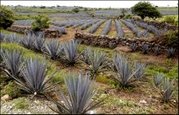I recently reported on new laws approved in Maryland and Ohio to allow restaurant patrons to carry out unfinished portions of wine purchased by the bottle.
Add Rhode Island to the list.
Gov. Donald Carcieri has signed into law what statehouse denizens in providence have been referring to as a "merlot-to-go" bill. It lets restaurants recork and seal unfinished bottles of wine. Supporters of the law say it should reduce drunken driving because people will no longer feel that they must finish a bottle of wine.
As in the 30 other states allowing such activity, the bottles need to be recorked and transported in an inaccessible area, such as a car's trunk or behind the last upright seat in a van.
20060717
Tequila's home is sacred ground

Planning a trip to the many historical sites in Mexico? Consider adding one more area to your itinerary.
UNESCO, the U.N. Educational, Scientific and Cultural Organization, has named the agave growing area of Mexico's mountainous Jalisco state a World Heritage site.
Agave, the basis of the production of tequila liquor, has helped fuel the local and national economy. The state is dominated by distilleries, breweries, cantinas and liquor stores. The majority of the 60,000 residents work in the drink industry or in its spillover tourism industry.
"We are very emotional. There is a lot of joy among people here because we have been waiting for this for a long time," said Yadira Gaytan, assistant mayor of Tequila.
UNESCO's World Heritage Committee, which met last week in Lithuania, is responsible for implementing the 1972 U.N. Convention on the protection of cultural and natural sites around the world.
The specified area is located between the foothills of the Tequila Volcano and the Rio Grande river valle. It includes an archaeological site nearly 2,000 years old and colonial distilleries going back to the 16th Century.
"We are very happy," Ramon Gonzalez, director of the Tequila Regulatory Council, told Agence France-Presse. "It will help about 10,000 families in the region whose livelihood depends directly of the agave root."
Gonzalez said local authroities hope to turn the area into a major tourist attraction similar to California's wine Napa Valley or the wine Rioja route in northern Spain.
It is one of numerous World Heritage sites in Mexico. The others:
* Agave Landscape and Ancient Industrial Facilities of Tequila
* Ancient Maya City of Calakmul, Campeche
* Archaeological Monuments Zone of Xochicalco
* Archeological Zone of Paquimé, Casas Grandes, Chihuahua
* Earliest 16th-Century Monasteries on the Slopes of Popocatépetl
* Historic Centre of Mexico City and Xochimilco
* Historic Centre of Morelia, Michoacán
* Historic Centre of Oaxaca, Oaxaca, and Archaeological Site of Monte Albán
* Historic Centre of Puebla, Puebla
* Historic Centre of Zacatecas, Zacatecas
* Historic Fortified Town of Campeche, Campeche
* Historic Monuments Zone of Santiago de Querétaro
* Historic Monuments Zone of Tlacotalpan
* Historic Town of Guanajuato, Guanajuato, and Adjacent Mines
* Instituto Cultural Cabañas, Guadalajara, Jalisco
* Luis Barragán House and Studio
* Pre-Hispanic City of El Tajín
* Pre-Hispanic City and National Park of Palenque
* Pre-Hispanic City of Chichén Itzá
* Pre-Hispanic City of Teotihuacan
* Pre-Hispanic City of Uxmal
* Rock Paintings of the Sierra de San Francisco
* Sian Ka'an biosphere reserve, Quintana Roo
* Whale Sanctuary of El Vizcaino
* Franciscan Missions in the Sierra Gorda of Querétaro
* Islands and Protected Areas of the Gulf of California
Here are links to some good sites for Mexican travel information:
Let'sGo2.Mexico
Lonely Planet's Mexico
Mexico Travel 101
Interactive Mexico Travel Resource
Subscribe to:
Comments (Atom)